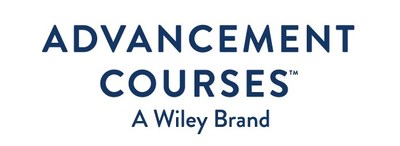HOBOKEN, N.J., Jan. 27, 2020 /PRNewswire/ -- Advancement Courses, a Wiley brand JWA JWB and leader in online K–12 professional development, today announced research revealing the state of professional development for teachers. This report sheds light on how much schools are spending, where the money is coming from, what training looks like day-to-day, and the myriad factors and challenges that impact school leaders' choices for professional development.

The new report, "Professional Development for Teachers: What Schools Value and How They Invest," analyzed survey results from administrators nationwide and found that nearly 90 percent of school leaders believe that professional development is a good investment for their district. However, their level of satisfaction varies based on a variety of factors. Budget, funding, online offerings, and teacher input all affect how professional development is perceived by educators across the United States.
"The Professional Development for Teachers report is just a starting point in analyzing how professional development can help our teachers, across the U.S., become better educators," said Daniel Kosta, senior director of marketing at Advancement Courses. Through Advancement Courses' research, we hope to help school and district leaders see how they compare to other schools, identify opportunities to create meaningful professional development experiences, and provide teachers with valuable tools to teach the next generation of students in the most impactful way possible."
Significant findings of the report include:
- Schools' average spending on professional development is inversely tied to the size of the district. The average cost of professional development per educator falls into three distinct tiers: districts with 1–100 educators ($500 per educator), districts with 101–1,000 educators ($100 per educator), and districts with more than 1,000 educators ($30 per educator). Larger districts are more likely able to offer their professional development at a lower cost per educator because they have more internal resources and opportunities to scale their programs.
- The source of funding makes a difference in the choice of and satisfaction with professional development. Schools that receive funding from multiple sources offer more professional development options than schools that rely heavily on local taxes for funding. The schools with multiple funding sources express higher rates of satisfaction with their professional development despite having lower budgets than schools with local tax funding.
- Technology education is school leaders' top choice for professional development. More than twice as many schools identify technology training, for both classroom devices and integration techniques, as the most popular option for professional development compared to the next most popular topic.
- Most professional development happens in-person and on in-service days. Only 30 percent of schools have primarily online professional development, even though the flexibility tends to create higher satisfaction for school leaders.
- Teachers rarely have input on professional development. Only 24 percent of schools allow teachers to vote on the topics of training they will receive. Furthermore, only seven percent are given the autonomy to decide what trainings they can participate in.
- Most school leaders believe professional development results in better teachers, but lack of time, money, and relevant options limits their ability to offer effective professional development. Nearly 90 percent of school leaders believe professional development is a good investment for their district. However, one third cite not having enough time as the biggest challenge to helping teachers improve their craft.
- School leaders value professional development that focuses on the school's or district's unique needs. School leaders value a personalized program that allows them to see the impact of the opportunities they offer to support their schools' current initiatives or needs.
Follow us on:
- Facebook: @AdvancementCourses
- Twitter: @AdvanceTeaching
- Instagram: @advancementcourses
For more information and the full report, please visit: https://www.advancementcourses.com/pd-for-teachers-report/.
About Advancement Courses, A Wiley Brand
For more than 30 years, Advancement Courses, a Wiley brand, has been a leader in professional development, providing expertly crafted, classroom-applicable courses to thousands of teachers across the country. With more than 240 online courses in 20 different subject areas in our catalog, we create customizable professional development plans for schools and districts so they can offer training in the topics that matter most to them, including ESSA requirements, district/school improvement plans, teacher wellness and retention, and much more. All courses are graduate level, online, and self-paced to allow for maximum flexibility and no disruption to classroom time. For more information, visit https://www.advancementcourses.com/schools-districts/
About Wiley
Wiley drives the world forward with research and education. Through publishing, platforms and services, we help students, researchers, universities, and corporations to achieve their goals in an ever-changing world. For more than 200 years, we have delivered consistent performance to all of our stakeholders. The Company's website can be accessed at www.wiley.com.
SOURCE Advancement Courses, A Wiley Brand
© 2024 Benzinga.com. Benzinga does not provide investment advice. All rights reserved.
Trade confidently with insights and alerts from analyst ratings, free reports and breaking news that affects the stocks you care about.